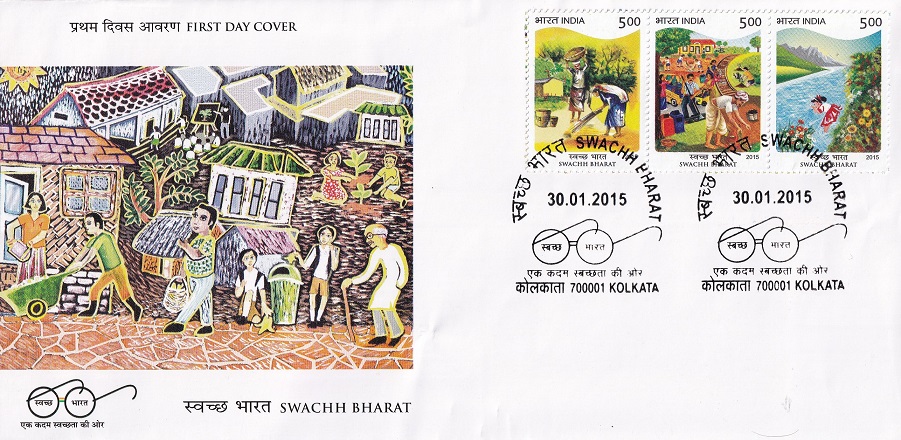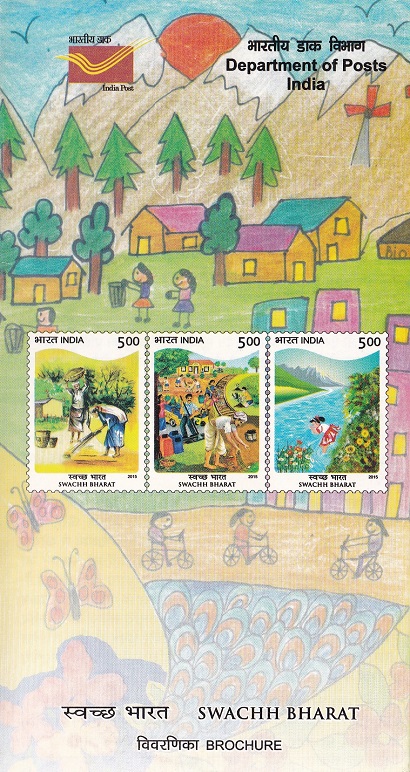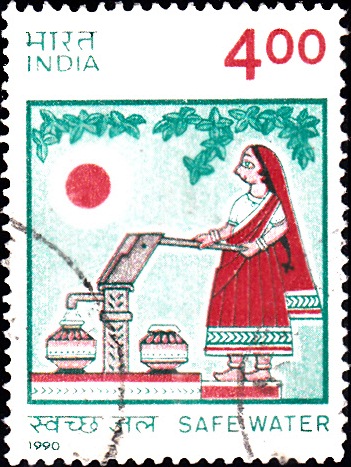
Swachh Bharat 2015
A Miniature Sheet consisting of 3 nos. of commemorative postage stamps on the Swachh Bharat Abhiyan (SBA, Clean India Mission) :





 Issued by India
Issued by India
Issued on Jan 30, 2015
Issued for : Department of Posts is pleased to release a set of 3 Commemorative Postage Stamps on ‘SWACHH BHARAT’ on the occasion of martyrdom day of Mahatma Gandhi on 30th January 2015.
Design : The Department of Posts organised an All India stamp design competition on the theme Clean India. The designs for the three stamps and the miniature sheet, the First Day Cover, and the Brochure on the theme Swachh Bharat have been based on the shortlisted entries. Three best entries were also awarded prizes.
Credits :
Stamp/FDC/Miniature Sheet : Sankha Samanta(based on selected entries including, those by M. Vaibhav Shenoy, Ankita De, Jenwin Baby, Dr. K. S. Bharanija, J. Sreeramulu and Manandeep K. Sondh, received through All India Stamp design competition)
Cancellation : Alka Sharma
Type : Miniature Sheet, Mint Condition
Colour : Multi colour
Denomination : 500 Paise each
Stamps Printed : 0.5 Million
Miniature Sheet : 0.2 Million
Printing Process : Wet Offset
Printer : Security Printing Press, Hyderabad
About :
- India is an emerging economic powerhouse and a global leader and continues to be one of the largest economies in the world with a GDP projected to grow by 6.5 percent by the end of 2015. India has also become the fourth largest energy consumer in the world. This rapid growth and the accompanying increase in greenhouse gas emissions raise national concerns about climate change. It becomes even more important for us to take immediate remedial action because future generations will also be affected by these decisions and the extent to which these issues have been addressed. They would be required to deal with environmental risks, depletion of resources, the loss of biodiversity and radioactive wastes etc.
- Urban lifestyles have a huge impact on the environment. Our lifestyles have large carbon footprints which affect the climate adversely. Everything we do, ranging from taking a flight to just having a cup of coffee, requires energy which usually comes from combustion of fossil fuels. Thus, every action has a carbon footprint associated with it. Therefore, it is of utmost importance that carbon emissions are assessed and measures to promote a greener low carbon lifestyle are devised and followed.
- Beyond carbon concerns, other challenges including land use, transportation bottlenecks, and local air pollution are strong drivers for diversification of supply away from conventional sources of energy like coal, especially through renewable energy. While the regulatory authorities continue to play their role, programmes that are community based are required to be put in place to deal with the situation we find ourselves in. These will help the community as a whole to understand local issues and take necessary initiatives to improve the local environmental conditions and come-up with locale-specific initiatives to improve the surrounding environmental conditions.
- Sanitation is now universally recognized as a major proximate determinant for health indicators. The impacts on human health of poor sanitation and unhygienic practices is significant. Waterborne diseases and intestinal infections that are among leading causes of malnutrition, illness and death are often related to poor sanitation. The challenge that India with its large population, size & different hydro-geological regions faces in the area of sanitation, is enormous.
- On 2nd October, 2014 the Swachh Bharat Mission, a mass movement, that sought to create a Clean India was launched. Cleanliness was very close to Mahatma Gandhi‘s heart and it was felt that a clean India was the best tribute that could be paid to Gandhiji when we celebrate his 150th birth anniversary in 2019. While launching the Swachh Bharat Mission the Prime Minister of India urged everyone to devote at least hundred hours every year, that is two hours every week, towards cleanliness. The Mission seeks to achieve an Open Defecation Free India by 2nd October, 2019. This involves providing access to toilets to all households and also making adequate arrangements for Solid and Liquid Waste Management. The Swachh Bharat Mission has two sub-missions – Swachh Bharat Mission (Gramin) and Swachh Bharat Mission (Urban).
- Text : Based on material received from Ministry of Drinking Water & Sanitation and internet.








[…] of the message of Bapu. Bapu’s lessons are relevant in every policy of the country such as Swachh Bharat, rights of women and children and of civil liberties of small and disadvantaged groups, health and […]
[…] Swachh Bharat Mission was launched by Hon’ble Prime Minister Shri Narendra Modi on 2nd October, 2014 with the aim of achieving an open defecation free (ODF) India by 2nd October, 2019 as a befitting tribute to Mahatma Gandhi on his 150th Birth Anniversary. Since October 2014, the rural sanitation coverage has increased from 38.7% to over 99%, over 10 crore toilets have been built and over 599963 villages, 699 districts and 35 States/UTs have been declared open defecation free (ODF). The programme has brought about massive behaviour change and strengthened implementation and delivered mechanisms down to the Gram Panchayat (GP) level. […]
[…] servants of Reasi Block in Jammu and Kashmir for becoming an Open-Defecation free state under the Swachh Bharat Campaign. Such examples showcase how Mann Ki Baat is not just a radio programme, but a reflection of […]